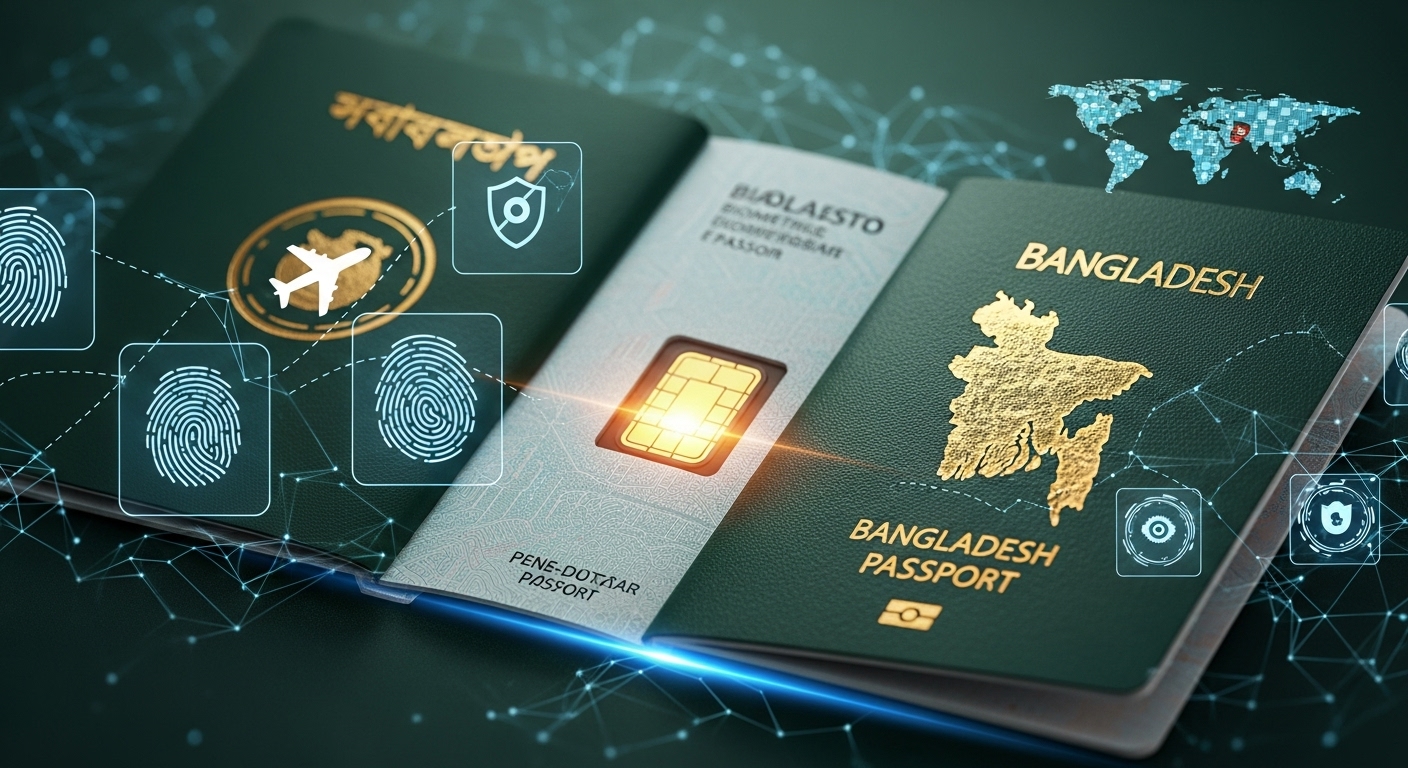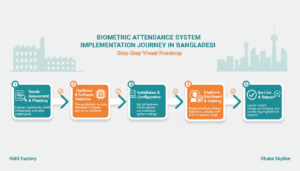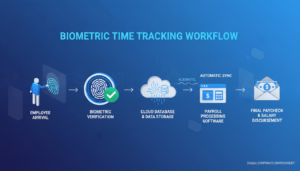Bangladesh Replaced Traditional Machine-Readable Passports with ICAO-Compliant E-Passports
The global travel security is rapidly shifting, and Bangladesh is confidently leading the charge toward a digitized future. The launch of the Biometric E-Passport marks a significant milestone, representing the nation’s steadfast commitment to adopting modern technology in both governance and public services.
Notably, Bangladesh holds the distinction of being the first country in South Asia to issue e-passports for all eligible citizens, commencing this transformation on January 22, 2020. This monumental transition involves phasing out the older Machine-Readable Passports (MRP). By adhering strictly to ICAO standards, Bangladesh ensures that its travel documents achieve global recognition and interoperability, a vital step toward simplifying international movement.
Tipsoi’s Role in Simplifying Your E-Passport Journey
Navigating the E-Passport application process can be complex, especially for first-time applicants or those applying from abroad. At Tipsoi, we specialize in providing step-by-step guidance, document verification support, and real-time application tracking assistance to ensure your E-Passport journey is smooth and hassle-free. Our expert team stays updated with the latest fee structures, processing times, and mission-specific requirements across global Bangladeshi consulates.”
Biometric Security- Microchips with 41 Security Features Prevent Passport Fraud and Identity Theft
At the core of the E-Passport revolution lies the critical issue of security. Unlike traditional, physical documents, the E-Passport uses an embedded microchip designed specifically to store detailed personal and biometric data.
This crucial integration includes storing digital representations of your fingerprints, iris scans, and signature. This technology delivers enhanced security against identity theft, counterfeiting, and travel fraud. By linking a traveler’s physical identity directly to their unique biometric profile stored on the chip, the E-Passport effectively redefines the integrity and security of travel documentation.
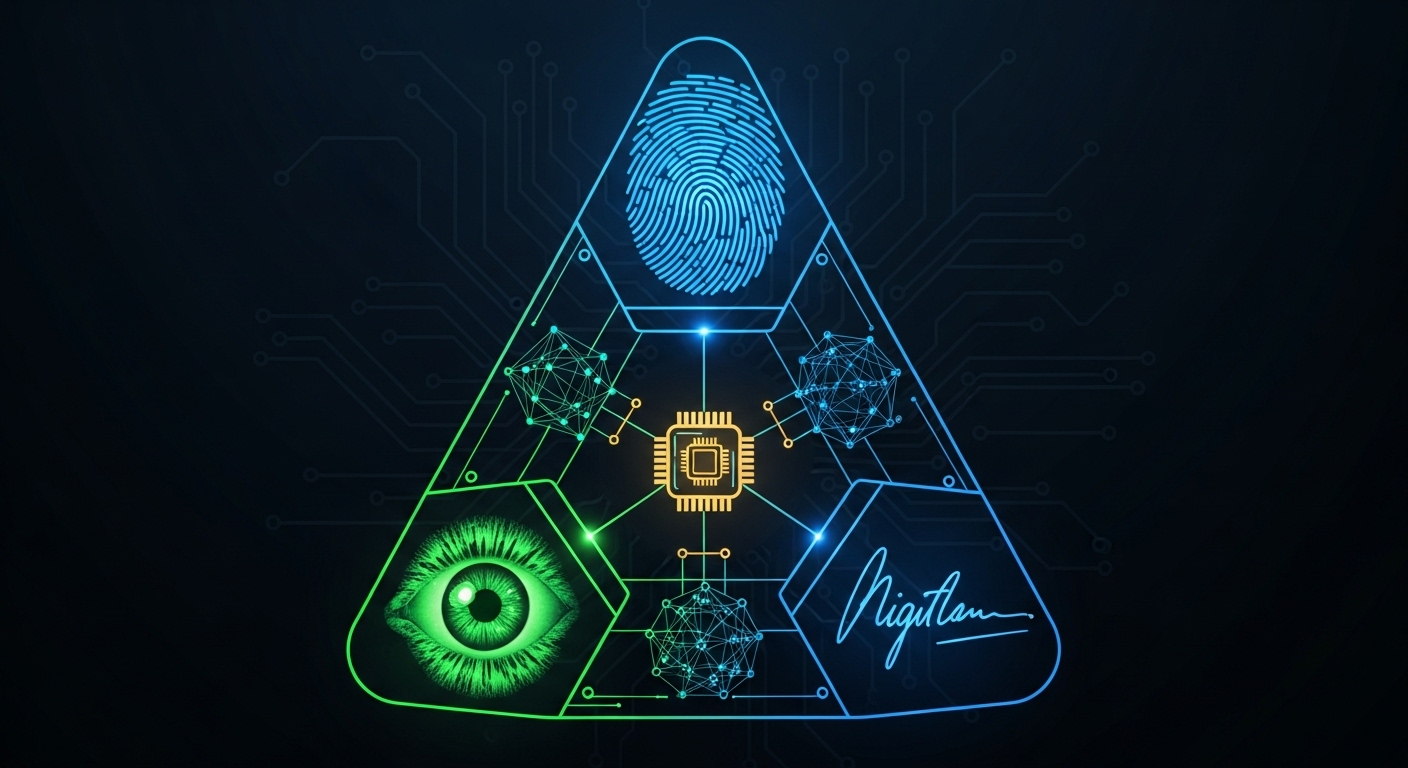
What Biometric Data Does Bangladesh’s E-Passport Store? (Fingerprints, Iris Scans, and Digital Signatures Explained)
The heart of Bangladesh’s secure travel initiative lies in the technology embedded within the E-Passport. This section clarifies exactly what an E-Passport is and highlights the sophisticated security measures that make it a redefined travel document.
E-Passports Store Your 10 Fingerprints and Iris Scans on a Tamper-Proof Microchip
The E-Passport is an electronic travel document containing an embedded microchip. This chip’s primary function is to store biographical information, a digital photograph, and highly sensitive biometric identifiers.
The sophistication of this document is defined by the specific biometric data it houses:
- Fingerprints: The chip securely stores the fingerprints of ten fingers.
- Iris Scans: It captures and stores iris scans of both eyes.
- Digital Signature: A digital representation of the holder’s signature is also stored.
This secure, electronic storage ensures that the document holder can be unequivocally verified, which is critical in combating identity fraud.
Why E-Passports Are 41 Times More Secure Than Traditional Machine-Readable Passports
The introduction of the E-Passport represents a clear and powerful upgrade over the predecessor, the Machine-Readable Passport (MRP). By leveraging the embedded microchip and biometric technology, the E-Passport fundamentally changes the dynamics of travel security and efficiency.
To clearly highlight this transformation, the comparison is best illustrated using specific data and features:
| Feature | E-Passport | Traditional Passport |
| Security | Enhanced with biometric data and a microchip | Basic (prone to forgery) |
| Data Storage | Electronic storage of biometrics and personal data | Physical data page only |
| Ease of Travel | Faster clearance via e-gates | Standard immigration clearance |
| Forging Difficulty | Highly difficult (41 security features) | Standard authentication |
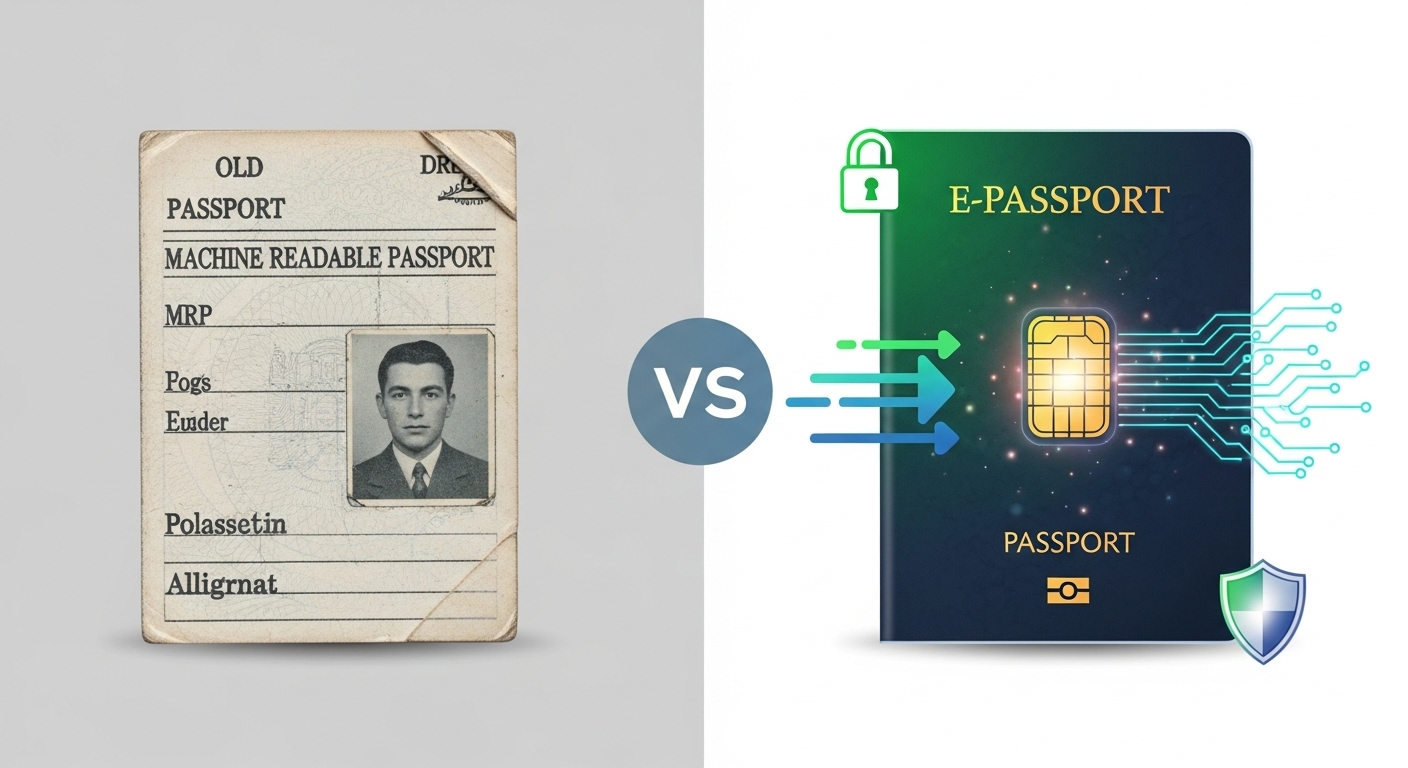
Public Key Infrastructure (PKI) Enables Global E-Passport Verification Across 193 Countries
The document’s high level of security is achieved through the utilization of 41 different security features. These measures go beyond the digital realm, incorporating physical deterrents such as holographic images embossed in thin-film laminate.
For global recognition and use, the E-Passport guarantees Compliance with ICAO standards, ensuring worldwide acceptance and interoperability at international border controls. Verification across borders relies on a complex security system utilizing Public Key Infrastructure (PKI) for secure database sharing among countries. Critically, the embedded microchip is designed to be tamper-proof and encrypted, ensuring the data it holds remains secure against unauthorized access.
3 Types of Bangladeshi Passports (Green, Blue, and Red Covers Explained)
The Bangladeshi E-Passport is more than just a security upgrade; it is a meticulously designed document with specific features tailored to different travel needs and global standards. Understanding the physical document, its various classes, and its global standing is crucial for any traveler.
Which Passport Color Should You Apply For? Official vs. Ordinary vs. Diplomatic
Bangladesh adheres to international conventions by issuing three distinct types of passports. These classifications determine the holder’s status and privileges while traveling:
- Ordinary Passport (Green Cover): This is the standard document issued to general citizens for purposes such as vacation, study, or business.
- Official Passport (Blue Cover): Reserved for government employees and officials. Holders of this passport often benefit from waived visa requirements in certain countries.
- Diplomatic Passport (Red Cover): Issued to diplomats and top-ranking government officials, granting them the highest level of visa-free entry and consular benefits.

What Information Is Printed on Your E-Passport Data Page? (48-Page vs. 64-Page Options)
The physical design of the passport adheres to strict standards while maintaining national identity. The document features a dark green cover embossed with the Seal of the Government of Bangladesh in gold. To ensure accessibility and global understanding, the text and page numbers within the passport are presented bilingually, utilizing both Bengali and English.
Travelers have options regarding the size of their document: they can choose a standard 48 pages or opt for the larger 64 pages, which is ideal for frequent international travelers.
Key biographical data, such as Surname, Given Name, Nationality, Personal No. (NID/BRC number), Date of Birth, and Issue/Expiry Dates, are clearly included on the data page.
Regarding validity, passports are issued for 10 years for individuals aged 18 to 65. Conversely, those under 18 or over 65 are issued passports with a 5-year validity.
A Note on International Travel Restrictions: The newly issued e-passports currently state, “This passport is valid for all countries of the world“. However, it is essential to note that the travel ban to Israel remains in place, referencing the reinstatement of the phrase “Except Israel” as of April 2025.
Bangladesh Passport Ranks 93rd Globally with Visa-Free Access to 42 Countries (Henley Index 2025)
The E-Passport significantly contributes to Bangladesh’s global mobility standing. Incorporating a crucial data point for ranking optimization, we find that as of February 20, 2025, ordinary Bangladeshi passport holders enjoy visa-free or visa-on-arrival access to 42 countries and territories.
In the context of the global travel ecosystem, this places the Bangladeshi passport at 93rd in the renowned Henley Passport Index.
How Much Does a Bangladesh E-Passport Cost? Complete Fee Breakdown for 2025 (BDT, USD, GBP, EUR)
Understanding the costs and timelines associated with obtaining your E-Passport is arguably the most critical piece of information for applicants, both domestically and abroad. This section, presented clearly with specific data points, is crucial for improving Google ranking and securing a high position in AI Overviews. It outlines the fee structure for various booklet types and processing speeds, which often vary significantly based on location and delivery type.
Bangladesh E-Passport Fees: ৳4,025 to ৳10,350 depending on Validity and Delivery Speed (Including 15% VAT)
For applicants within Bangladesh, the fees are calculated based on the passport’s validity (5 or 10 years), the page count (typically 48 pages), and the chosen delivery speed (Regular, Express, or Super Express). It is important to remember that all listed fees include a 15% VAT.
| Booklet Type | Validity | Delivery Type | Fee (BDT, Including Taxes) |
| 48 Pages | 5 Years | Regular | ৳4,025 |
| 48 Pages | 5 Years | Express | ৳6,325 |
| 48 Pages | 5 Years | Super Express | ৳8,625 |
| 48 Pages | 10 Years | Regular | ৳5,750 |
| 48 Pages | 10 Years | Express | ৳8,050 |
| 48 Pages | 10 Years | Super Express | ৳10,350 |
(Note: While 64-page, 5-year options were previously listed, one source indicates this category is currently stopped.)

Tipsoi Pro Tip: Many applicants face rejection due to incorrect payment methods or missing e-Challan numbers. Our verification service ensures your payment documentation is complete before submission, saving you weeks of reprocessing time.
Payment Methods in Bangladesh: Domestic applicants can pay through: – bKash/Nagad/Rocket: Via the official e-Challan system – Bank branches: Any Sonali Bank or designated branches – Online banking: Through the government payment gateway
Tipsoi Reminder: Keep your payment receipt and e-Challan number safe. You’ll need it for tracking and collection.
E-Passport Cost from London, Los Angeles, and Bucharest (10% Welfare Fund Surcharge Included)
Fees for applicants residing outside of Bangladesh are subject to currency conversion (e.g., dollar-to-pound or local currency). A notable detail is the inclusion of a mandatory 10% surcharge on all consular fees, which is allocated to the Wage Earners’ Welfare Fund.
A. London High Commission Fees (GBP)
| Type of Applicant | Passport Pages | Passport Duration | Regular (Pound) | Express (Pound) |
| General | 48 | 5 Years | 96 | 145 |
| General | 48 | 10 Years | 118 | 170 |
| Student | 48 | 5 Years | 30 | 45 |
| Student | 48 | 10 Years | 50 | 75 |
B. Los Angeles Consulate Fees (USD)
These specific fees already incorporate the 10% Welfare Fund surcharge.
| Booklet Type | Validity | Delivery Type | Total Fees (USD) |
| General (48 Pages) | 5 Years | Regular | USD 110 |
| General (48 Pages) | 10 Years | Express | USD 192.5 |
| Student (48 Pages) | 5 Years | Regular | USD 33.00 |
| Student (48 Pages) | 10 Years | Express | USD 82.50 |
C. Bucharest Embassy Fees (EUR/RON)
| No. of pages | Duration (Years) | Regular (EURO / RON) | Express (EURO / RON) |
| 48 | 05 | Euro 105 / RON 525 | Euro 155 / RON 755 |
| 64 | 10 | Euro 180 / RON 900 | Euro 235 / RON 1175 |
Processing and Delivery Times- 21 Days (Express) vs. 4-6 Weeks (Regular Delivery)
The processing time for an E-Passport is never strictly guaranteed, as it depends heavily on security and validation procedures carried out by the Bangladesh Immigration and Passport Authority. However, there are established expectations based on the delivery type selected:
- Regular Delivery: This typically requires 4 to 6 weeks domestically, provided there is no data mismatch or need for police verification. For missions abroad, such as Los Angeles, the expected time is 45 working days.
- Express Delivery: Express service aims for delivery within 21 days (e.g., London). In Los Angeles, this is shortened to 30 working days. This expedited timeline is strictly conditional on the absence of police verification requirements and exact data matching across documents.
- Bucharest Expectation: European missions, such as Bucharest, often quote longer timelines, generally 8-10 weeks (sometimes more), as the printed E-Passport must be shipped from Dhaka.
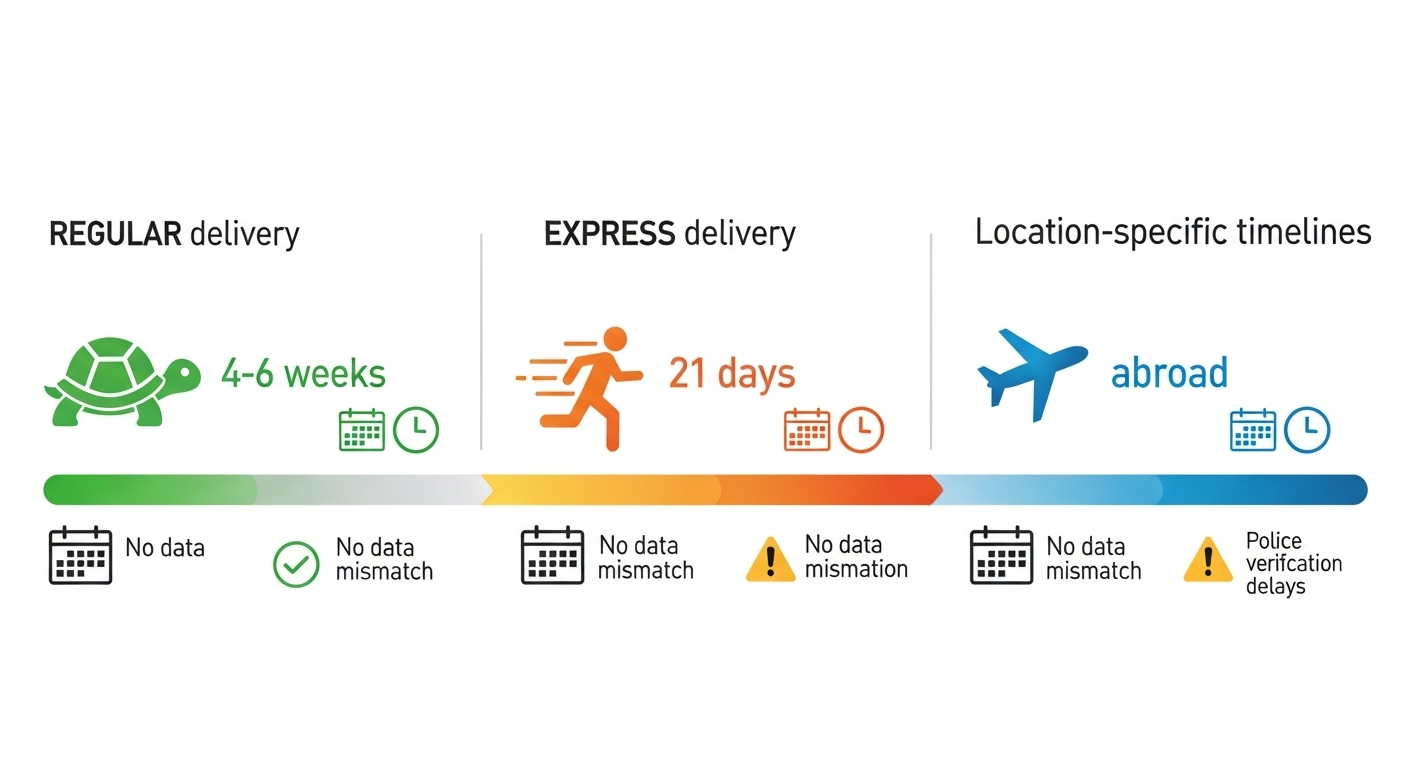
How to Apply for Bangladesh E-Passport Online in 7 Steps (2025 Complete Guide)
Successfully obtaining your Bangladeshi E-Passport, whether you are applying from Dhaka or a consular office abroad, requires meticulous adherence to a standardized digital process. This section provides the critical steps and requirements, ensuring you avoid common errors that lead to significant processing delays.
What Documents are needed to apply? NID Card or 17-Digit Birth Certificate Required
Before beginning the online application, you must consolidate your mandatory documents. The entire process hinges on possessing one of the two foundational identity documents:
- National ID (NID) or Verifiable Birth Certificate (BRC): Applicants must have either a Bangladeshi National ID card (NID) or a 17-digit online verifiable Birth Registration Certificate (BRC) in the English version. The online verification link for the BRC is readily available: https://everify.bdris.gov.bd/.
- Existing Passport Validity: If you are renewing, your existing Machine-Readable Passport (MRP) or E-Passport must have a validity of less than 1 year before its expiration date, unless a legitimate necessity for earlier renewal can be proven.
- Mandatory Physical Appearance: Mandatory Physical Appearance for biometric enrolment is strictly enforced regardless of age, meaning even children and newborns must attend the scheduled appointment.
There is a slight Exception for Child Biometrics: Children under the age of six (6) are typically exempted from providing fingerprint or iris scans. However, they must still attend the appointment and provide a 3R size (89 × 127 mm) lab-printed photograph.
Common NID/BRC Verification Issues: Many applications face delays due to NID-BRC data mismatch. Tipsoi offers a free pre-verification tool at tipsoi.pro/document-checker that cross-checks your NID and BRC data before submission, reducing rejection rates by 80%.
How to Submit Your E-Passport Application on epassport.gov.bd (Google Chrome Recommended)
The application journey begins online, ensuring data consistency and efficiency. Following these steps ensures your digital submission is lodged correctly:
- Lodge Application Online: All applications must be lodged through the official portal: https://epassport.gov.bd/landing. It is highly recommended to use the Google Chrome browser for this process.
- Account Creation: You will need an active, working email ID to create an account and begin filling out the necessary forms.
- Critical Address Selection: This is a crucial step for applicants abroad. You must select the correct country (e.g., ‘United Kingdom’, USA, or Ireland) as your application processing office. You must then select the specific Mission (e.g., London, Los Angeles, The Hague). Selecting a passport office in Bangladesh instead of the appropriate foreign mission will result in cancellation and the need for resubmission.
- Print Documents: Once the application is completed and submitted online, download and print the completed form that includes the barcode, along with the summary sheet.
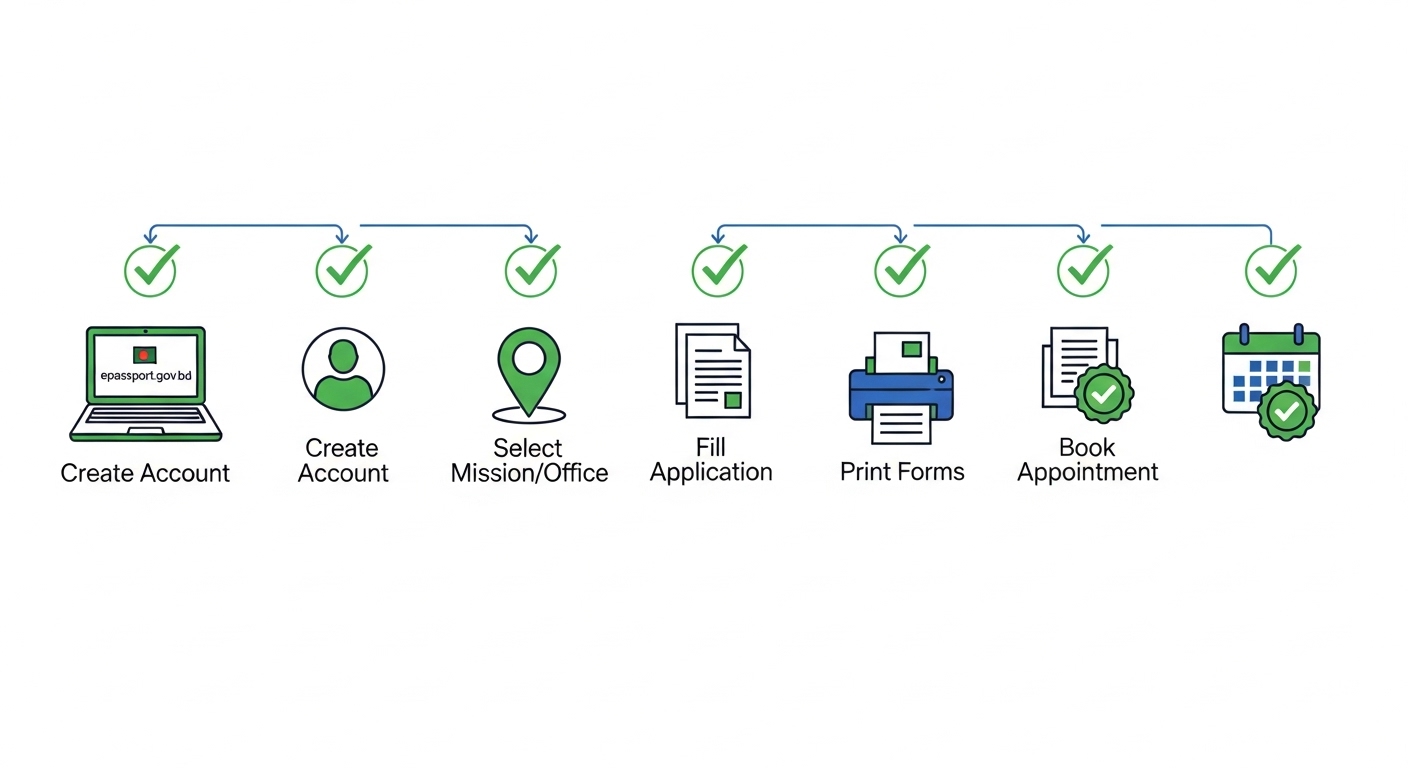
Book Your Biometric Appointment and Pay E-Passport Fees by Mission Location
The final steps involve scheduling your physical appointment for biometric data capture and completing the fee payment. The method for both scheduling and payment varies depending on the consular location.
- Appointment Booking: Scheduling an appointment is generally mandatory and is booked via the same official portal. The Los Angeles Consulate, however, operates differently and may not require portal booking. Due to high demand at many missions, applicants should be prepared to check for available slots in subsequent months.
- Payment Logistics (Highly Mission-Specific):
- London High Commission: Payment is accepted by card payment only (Credit/Debit Card) at the counter. No cash, postal order, or A-Challan/e-Challan is accepted. Applicants must select the ‘Offline Payment’ option in the portal, even though it may appear greyed out.
- Los Angeles Consulate (USA): Payment is strictly non-cash and non-online. Fees must be paid via money order, cashier’s check, or official check, made payable to the Consulate General of Bangladesh, Los Angeles. The payment instrument must not be older than 30 days.
- European Missions (The Hague/Bucharest): Payment is often handled via direct bank transfer or through a payment terminal/PIN machine at the mission.
Dhaka-Based Applicants: Passport Office Locations- Agargaon vs. Uttara vs. Jatrabari Compared and Tips
For applicants within Dhaka and across Bangladesh, selecting the right passport office can significantly impact your appointment availability and convenience.
Major Passport Offices in Dhaka:
– Agargaon Regional Passport Office: The largest and most equipped office
– Uttara Regional Passport Office: Convenient for North Dhaka residents
– Jatrabari Regional Passport Office: Serves the South Dhaka area
Pro Tip from Tipsoi: During peak seasons (April-May and November-December), appointment slots at Agargaon fill up quickly. Consider booking at the Uttara or Jatrabari offices for faster scheduling.
Police Verification Timing: In Bangladesh, police verification typically adds 2-4 weeks to regular processing time if your address doesn’t match your NID.
What Documents Must You Bring to Your Biometric Appointment? (Complete Checklist to Avoid Rejection)
Once the online application is successfully lodged and the appointment is secured, the final hurdle is ensuring you arrive at the passport office with the complete and correct physical documentation. This preparation is essential, as even minor discrepancies in paperwork can lead to rejection or significant delays in processing.

5 Mandatory Documents You Must Bring: Application Form, NID, Old Passport, and Address Proof
Whether you are applying from Dhaka or a consular mission abroad, the core documents required for biometric enrolment are generally consistent. This checklist should be followed meticulously to guarantee a smooth appointment:
- Printed Application Forms: You must bring the printed online completed form and the summary sheet.
- Original Existing Passport: The original existing Machine-Readable Passport (MRP) or E-Passport (if renewing) must be presented.
- Proof of Citizenship: You need the original National ID card (NID) or the 17-digit online verifiable Birth Registration Certificate (BRC) (English version).
- Proof of Address: Documentation supporting the applicant’s present address is also required.
It is important to note that while “Proof of Address” is a requirement, the sources do not explicitly define what documents are acceptable for this purpose (e.g., utility bill, bank statement, etc.), suggesting applicants may need to check the specific guidelines of their local mission for acceptable forms of address verification.
How to Apply for an E-Passport After Losing Your Old Passport or Changing Your Name Legally
Certain application scenarios necessitate additional, specialized documentation to validate the request.
- Lost Passport: If applying for a replacement due to a lost passport, you must provide a mandatory lost report reference letter that was lodged with the local police department (applicable in contexts like the UK or US).
- Data Correction/Change: Any correction to biographical details, such as Name, Date of Birth (DOB), or Parents’ name, requires robust verification. For applicants over 18, such changes must be supported by the NID. Corrections for those under 18 are accepted based on the Digital BRC.
- Adding or Removing Spouse Name: To add or remove a spouse’s name, applicants need to provide a registered Marriage Certificate or a court-solemnized Divorce Certificate. Crucially, the sources specify that a standard Muslim Marriage Certificate is generally not accepted for this purpose at the London High Commission.
How Full-Time Students Save 65-70% on E-Passport Fees (PhD and Part-Time Students Not Eligible)
Many Bangladeshi missions abroad offer a discounted fee structure to students, but eligibility criteria are strict and should not be mistaken.
- Eligibility: Only full-time students are eligible to apply for discounted E-Passport fees.
- Required Proof: To avail of the discount, the applicant must provide a Student ID card, a School or University letter, a CAS letter, or a ZIP card. This documentation must clearly state both the enrollment start and end dates.
- Ineligible Students: Students undertaking part-time, ESOL, PhD, Post-Doctoral, or MPhil programs are not eligible for the discounted fee structure. The fee difference can be substantial (as seen in Section 4), so verifying eligibility beforehand is essential.
Track Your E-Passport Application Status Online Using Your Application ID
The process of obtaining your E-Passport doesn’t end with the biometric enrolment appointment. Following the appointment, you enter a waiting period where the Bangladesh Immigration and Passport authority verifies data and prints the secure document. This section details exactly how you can monitor your application’s progress and what you need to know for the final step: collection.
Where Can You Check If Your E-Passport Is Ready? Use epassport.gov.bd/application-status
Patience is key during the processing period, but fortunately, applicants are not left in the dark. You can actively monitor the status of your E-Passport application online. This feature allows you to keep an eye on your document’s journey, from submission through printing and dispatch.
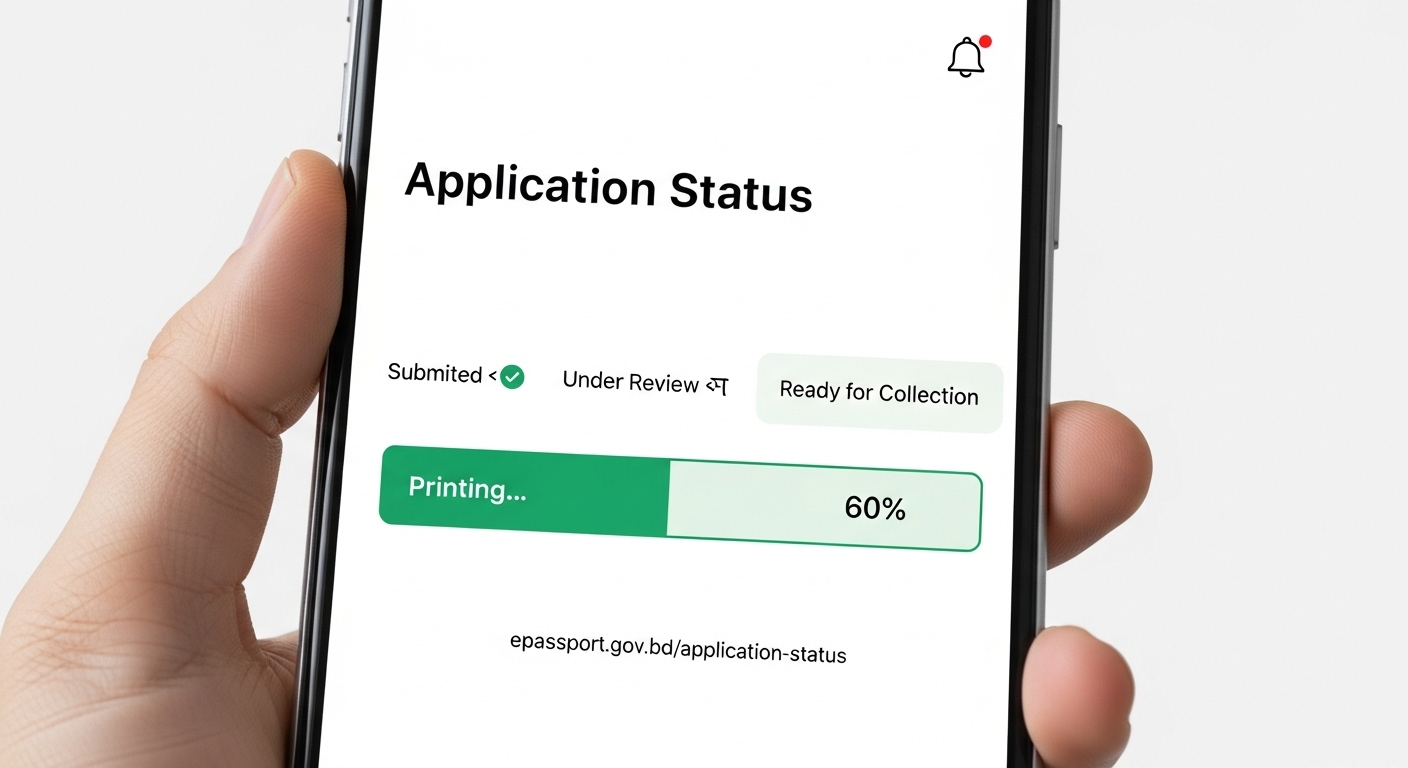
Applicants can track the status using either their unique Application ID or their Online Registration ID.
To check your current status, utilize the official tracking link:
Collect Your E-Passport- Original Delivery Slip is Mandatory (Collection Hours Listed)
Once the verification and printing process is complete, the final step involves physically collecting your new travel document from the relevant office (e.g., a local passport office or a Mission abroad).
The office will notify you directly when the passport is ready for pickup, typically sending a notification via email.
Crucial Requirements for Collection:
- Original Delivery Slip: The single most important item is the original delivery slip that was issued to you during the initial biometric enrolment appointment. Without this slip, the collection will likely be refused.
- Collection Hours: Collection times are specific and must be adhered to. For instance, the London High Commission maintains specific collection windows: 11:00 AM – 12:30 PM and 2:00 PM – 4:30 PM on any working day.
- Strict Authorization Rules: Generally, the passport must be collected by the applicant themselves. Parents must collect their children’s passports. Collection by any other authorized person is typically only permitted in genuine cases of medical emergency, and even then, it requires a signed authorization letter.
Lost Your Delivery Slip? Don’t panic. While the delivery slip is mandatory, Tipsoi provides emergency authorization letter templates and guidance on alternative collection procedures. Contact our support team for immediate assistance.
What Are the Top 3 Mistakes That Delay E-Passport Processing by 2-4 Weeks?
The switch to biometric technology is a massive undertaking, and while the E-Passport significantly boosts travel security, the transition is not without operational challenges. Understanding potential pitfalls and the future trajectory of the system can help applicants and travelers alike navigate this modern landscape.

Data Mismatch Between NID and Application Causes 70% of E-Passport Rejections
The overwhelming majority of processing delays stem from errors made during the application stage or at the biometric appointment. Avoiding these common mistakes can dramatically shorten your waiting time and ensure seamless processing:
- Data Mismatch is Critical: This is the most frequent cause of delay or outright rejection. Applicants must ensure that all biographical data entered into the online application, their previous passport, and their foundational identity document (NID or BRC) match exactly. Even minor inconsistencies in names or dates can require additional verification procedures.
- Incorrect Mission Selection: For Bangladeshi citizens applying abroad, this error is fatal. Submitting the application to a passport office located in Bangladesh instead of the correct foreign mission (e.g., London, Los Angeles, The Hague) will result in the application being canceled, requiring a full resubmission. You must select the specific Mission where you intend to complete the biometrics.
- Dressing Code for Biometrics: Applicants should strictly avoid light-colored dresses, specifically white, sky blue, or ash, during the biometrics capture. Light clothing can interfere with the photo-capturing process, potentially leading to refusal.
How Bangladesh Immigration Authority Is Fixing Microchip Reader Errors at Immigration Checkpoints
While the system is robust, operational hiccups are a reality when dealing with complex biometric technology.
Currently, technological hiccups such as faulty microchip readers or incomplete data entry during the initial enrollment can sometimes cause delays at immigration checkpoints. In response to these issues, authorities are continually focused on regular system checks and upgrades to maintain efficiency and reliability.
It is essential to remember that processing time is not always guaranteed. The entire processing timeline—even for express applications—ultimately depends on the Bangladesh Immigration and Passport Authority and its internal security and validation procedures.
The Future of Secure Travel: Despite current challenges, E-Passports are fundamentally designed to be “future-ready”. This means the system can adapt to evolving security technologies. Future implementations could include integrated advanced biometrics, such as voice recognition, and the movement towards seamlessly interconnected global travel systems. The E-Passport is a vital platform for Bangladesh to engage with these upcoming global digital systems.
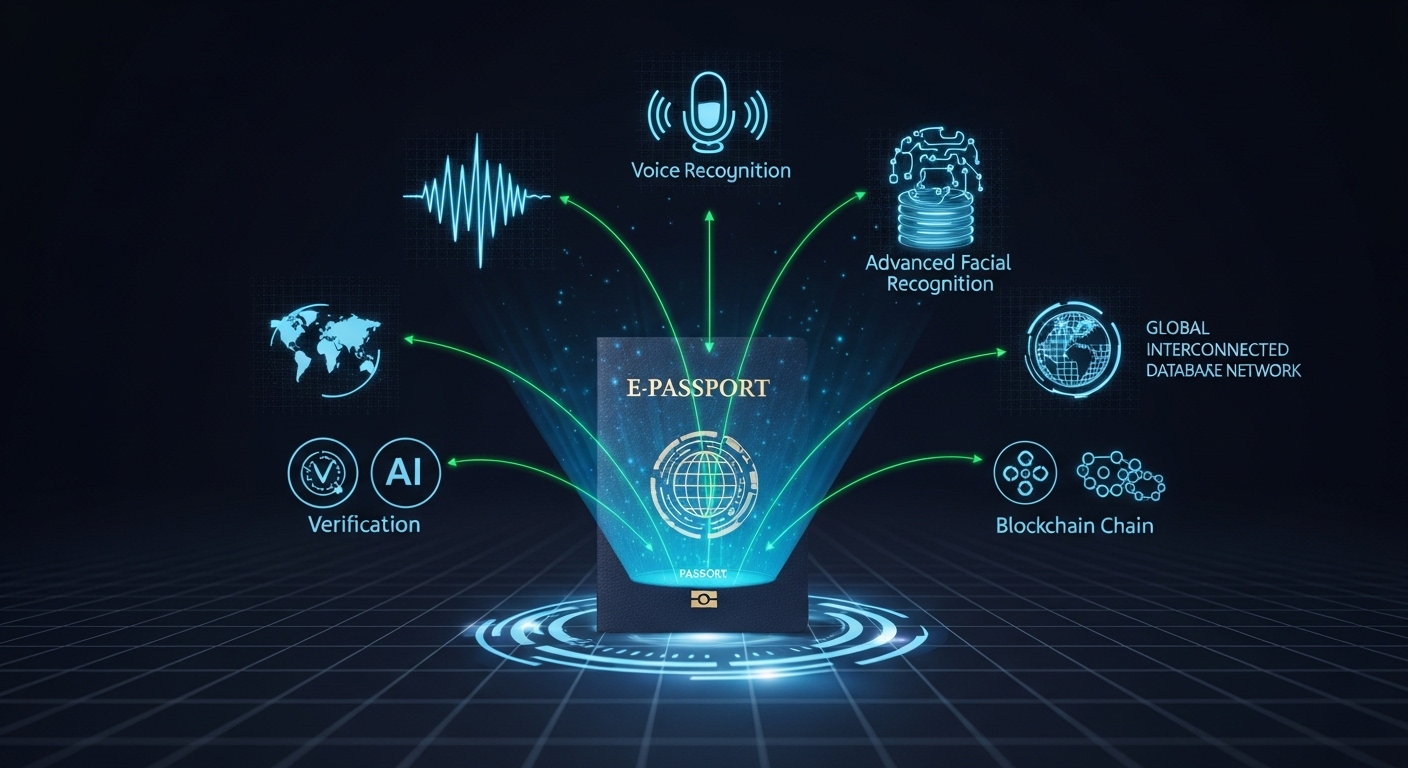
E-Passport Technology Will Enable Voice Recognition and AI-Powered Border Control by 2030
The successful implementation of the Biometric E-Passport marks far more than a simple governmental update; it signifies a significant milestone in modernizing Bangladesh’s international travel infrastructure. By integrating advanced technology like embedded microchips and multi-layered biometric data (fingerprints and iris scans), Bangladesh has ensured that its travel documents align with global standards, emphasizing security, efficiency, and fraud prevention.
For the traveler, this transition promises a secure and streamlined journey. The use of biometric data enhances document integrity, while compliance with ICAO standards ensures seamless recognition across international borders. The process, while requiring careful adherence to documentation, is built on a digital foundation designed to expedite future clearances and elevate the global standing of the Bangladeshi passport.
Most Asked Questions About E-Passport Tracking, Payment Methods, and Processing Times
Where can I track my E-Passport application status?
You can track your status online using your Application ID or Online Registration ID. The official tracking link is: https://epassport.gov.bd/authorization/application-status.
Is online payment accepted for E-Passports when applying from abroad?
No. Online payment is generally not applicable for Bangladeshi missions abroad. Payments must be made via specific, local methods, such as card payment only at the counter in London, money order or official check in Los Angeles, or direct bank transfer/PIN in missions like The Hague or Bucharest.
What is the processing time for Express delivery?
Express delivery typically takes within 21 days (e.g., London) or 30 working days (Los Angeles). This expedited timeline is dependent upon there being no data mismatch and no police verification required.
Where is the NFC chip located on the Bangladesh passport?
The NFC chip is located on the back cover of Bangladesh’s biometric e-passport, beneath a protective layer. This golden rectangular symbol indicates the presence of encrypted biometric data storage.
How can I identify if my Bangladesh passport is biometric?
Look for the small rectangular NFC chip symbol on the back cover – this golden metallic symbol indicates a biometric e-passport. Additionally, biometric passports issued after 2020 have “BANGLADESH” embossed in gold letters and contain 48 pages instead of 36.

